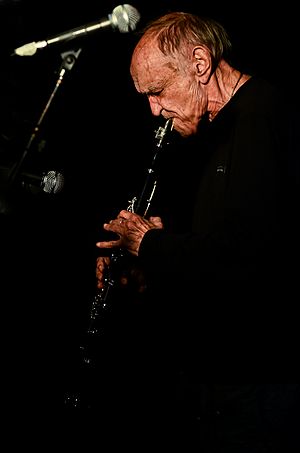Harold Rubin facts for kids
Harold Rubin (born May 13, 1932 – died April 1, 2020) was a talented artist and free jazz clarinet player. He was born in South Africa and later moved to Israel.
Contents
Early Life and Art
Harold Rubin was born in Johannesburg, South Africa, on May 13, 1932. He went to Jeppe High School for Boys and also studied art privately. As a teenager, he learned to play the classical clarinet. But he soon fell in love with jazz music. By age eighteen, he was playing at the Skyline Night Club. He also studied architecture at the University of the Witwatersrand and in London.
Fighting Apartheid with Art
In the 1950s and 1960s, Harold Rubin used his art and music to speak out against apartheid in South Africa. Apartheid was a very unfair system that separated people based on their race. Rubin didn't agree with these rules.
He formed his own jazz group in the 1950s. He would secretly go into black townships to play music with black musicians. This was very brave because it was against the rules of apartheid.
Rubin's visual artwork was first shown in 1956. One of his most important art projects was called Sharpeville (1961). This series of drawings showed the harsh actions of the apartheid government during the Sharpeville massacre in 1960.
Moving to Israel
In March 1963, Harold Rubin left South Africa because of the strict political situation. He moved to Israel and settled in Tel Aviv. There, he worked as an architect for a famous firm. He also taught at an architecture and design school from the 1960s until he retired in 1986.
Rubin continued to create art in Israel. From the 1960s, his art often commented on the military side of Israeli society. He focused a lot on anti-war themes in his work during the 1980s. His drawings and paintings have been shown in many countries, including Israel, South Africa, the United States, and Germany.
Return to Music
Harold Rubin stopped playing jazz for over ten years after moving from South Africa. But in late 1979, he started playing again. He became a founding member of the Zaviot jazz quartet in the 1980s. This group recorded albums and performed at festivals and clubs in Israel and Europe. The band played together until 1989.
Later, Rubin performed with many younger jazz musicians. These included Ariel Shibolet, Assif Tsahar, Daniel Sarid, Maya Dunietz, and Yoni Silver.
In 2008, he received the Landau Award for his amazing contributions to jazz music. He kept playing jazz with new generations of musicians in Tel Aviv.
Personal Life
Harold Rubin married Riva Wainer in 1957. They later separated and divorced in 1975. In 1976, he married Miriam Kainy, a well-known Israeli writer. Miriam Kainy wrote plays about Jewish–Arab relations and women's issues. Harold Rubin had two sons from his first marriage. He also had one daughter and two stepdaughters from his second marriage.
Harold Rubin passed away on April 1, 2020, at the age of 87.
Images for kids
See also
 In Spanish: Harold Rubin para niños
In Spanish: Harold Rubin para niños
 | Emma Amos |
 | Edward Mitchell Bannister |
 | Larry D. Alexander |
 | Ernie Barnes |



